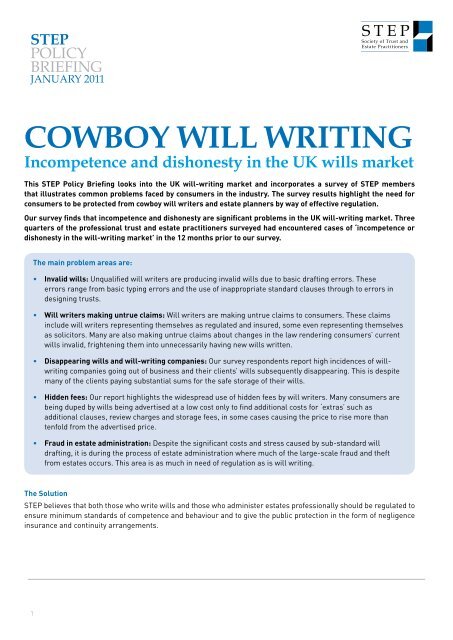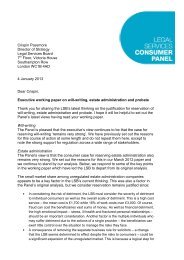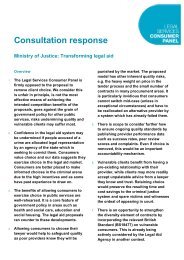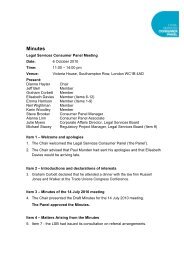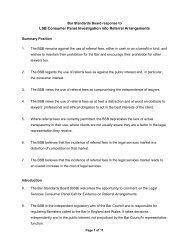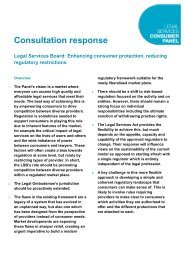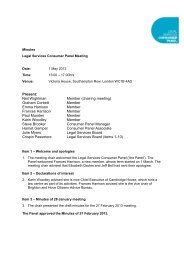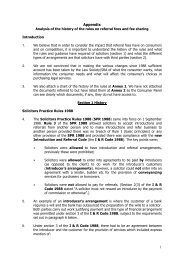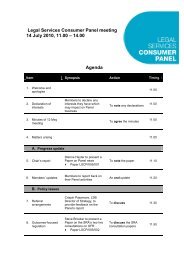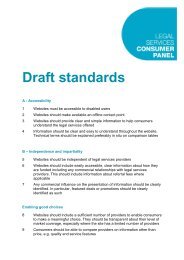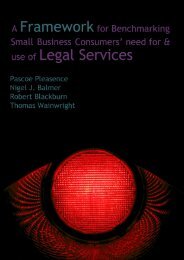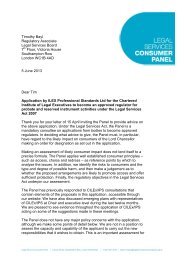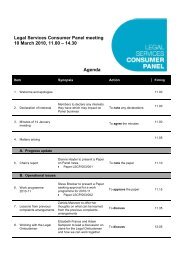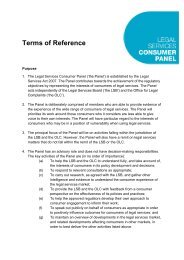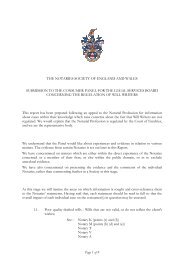COWBOY WILL WRITING - Legal Services Consumer Panel
COWBOY WILL WRITING - Legal Services Consumer Panel
COWBOY WILL WRITING - Legal Services Consumer Panel
Create successful ePaper yourself
Turn your PDF publications into a flip-book with our unique Google optimized e-Paper software.
STEP policy briefing january 2011Introduction: The Will-Writing MarketSTEP believes that everyone should be encouraged tohave a will. A will helps ensure that someone’s estatewill be used as they would wish after their death. Draftedproperly, a will can provide support to families, friendsand charities after a death. The National <strong>Consumer</strong>Council estimated in 2007 that 64 per cent 1 of adults inEngland and Wales do not have a will, while the Office ofFair Trading in 2010 estimates the figure at 53 per cent 2 .Passing-on an estate is probably the biggest financialtransaction most people will ever plan for. Those withrelatively simple affairs can often draft a usable willthemselves with the help of some research.Those with more complex affairs, however, are usuallybest advised to seek professional advice. The cost ofsuch advice will normally be modest relative to thepotential cost and family distress that can be causedif, for example, a badly drafted will fails to do what wasintended or is contested.The problem consumers currently face is that thebusiness of offering professional advice to thosewanting to make a will in England and Wales is totallyunregulated. As Lord Hunt, in his ‘Review of theRegulation of <strong>Legal</strong> <strong>Services</strong>’ noted, most people ‘wouldsurely be taken aback to learn that anyone can currentlyset himself or herself up as a will writer.’ 3 They needhave no technical qualifications, negligence insurance orcontinuity arrangements to protect clients should theycease trading for whatever reason. A survey conductedfor the Institute of Professional Will Writers found that 78per cent of the public thought that these issues should beremedied via regulation of will writers. 4STEP is concerned that incompetent, dishonestand unqualified will writers are taking advantage ofconsumers. Overcharging and basic errors are leading toconsiderable family upset.The Scottish government has moved to regulate nonlawyerwill drafters and confirmation agents through the<strong>Legal</strong> <strong>Services</strong> (Scotland) Bill 2010.In June 2010, the <strong>Legal</strong> <strong>Services</strong> Board launched a reviewof the threat posed to consumers in England and Walesby unprofessional will writers, and is currently seekingevidence of consumer harm.Although the UK government is now considering takingsome action, in the past it has been reluctant to do sobecause the numbers of officially reported problems havebeen relatively small.STEP believes this is a much wider problem thanis currently acknowledged and there may be verysubstantial underreporting of malpractice. One reason forthis is that problems with poorly drafted wills are usuallyonly discovered after a death when it is too late to remedythe situation. The consequences for those who pay forsub-standard wills are much added stress and the cost ofeither redrafting the will, or if post-death, the stress andcosts associated with intestacy or unnecessary tax bills.The Society of Trust and Estate Practitioners(STEP) is the worldwide professional body forpractitioners in the fields of trusts and estates,executorship and related issues. STEP aims topromote the highest professional standardsthrough education and training leading towidely recognised and respected professionalqualifications. STEP also works to demonstratethe value of good stewardship and planningacross future generations to governments,professionals, financial institutions and the public.STEP internationally has over 16,000 members,with almost 6,000 members in the UK. Over 4,000students worldwide are currently studying forSTEP qualifications and in the UK STEP supportsan extensive regional network providing trainingand professional development.1’‘Finding the will’, a report on will-writing behaviour in England and Wales, National <strong>Consumer</strong> Council, 20072‘Should will writing be a reserved legal activity?’, presentation to LSB will-writing workshop, Office of Fair Trading, 20103‘The Hunt Review of <strong>Legal</strong> <strong>Services</strong>’, The Law Society, October 20094Institute of Professional Will writers, June 20072
STEP Will-Writing SurveyTo gain a better understanding of the problems currentlyfacing consumers in the will-drafting market, STEPconducted a survey of its UK members and asked forexamples of malpractice they had encountered. For thepurposes of the survey, ‘will writer’ is defined as anyonewho writes a will and may include solicitors or nonsolicitorssuch as ‘will writers’ or Independent FinancialAdvisers (IFAs).The STEP Will-Writing Market Survey asked 693members of STEP (over 10 per cent of STEP’s UKmembership) whether they had encountered a numberof problems commonly cited as poor practice, and thenasked members to elaborate and provide examples ofsuch encounters.Main Survey Findings• 84 per cent of STEP members who responded havecome across at least one will containing draftingerrors in the last year, with more than 72 per centcoming across multiple wills containing errors.• 75 per cent of respondents have encountered cases ofincompetence or dishonesty in the will-writing marketin the last 12 months.• Two thirds of respondents reported coming acrosshidden fees that were not outlined in the stated pricefor a will.• 63 per cent have direct experience of cases wherewill-writing companies have gone out of business anddisappeared with their clients’ wills.• Just over one third have encountered cases whereincompetence has led to significant additionaltax bills.The survey results are presented with the percentages ofresponses to each question in graphical form followed bya summary of the examples or problems associated witheach question. Finally, a number of verbatim responsesfrom our members are included, which illustrate theproblems associated with each question.In the last year how many wills have you come across with drafting errors?60%50%40%30%20%10%0%None 1 2-6 7-10 11-20 21-50 Morethan 503
STEP Policy Briefing january 2011Basic MistakesHave you come across will writers whose wills are invalid due to basic mistakes in the will?YesNo40%60%Problems outlined included:• Problems with witnesses• Basic typing errors• Trust errors• The use of standard clauses• Lack of legal knowledge by will writers4
• Problems with witnesses: Wills have been signed by only one witness when two are required; witnesses have notbeen present when signing wills; practitioners have failed to ensure witnesses sign at the same time; witnesseshave signed but provided no dates at all; instances have occurred where beneficiaries and their spouses havewitnessed wills.• Basic typing errors: Basic errors have been made in the listing of names and address details included in thewill; errors have been encountered in page numbering; instances have occurred where names have beencompletely missed out; wills have been seen with pages missing; other instances where the principal beneficiarywas a completely incorrect person unknown to the testator (cut and paste errors); amendments have been madeto wills without being initialled by the testator or witnesses.• Trust errors: Errors have been made in designing trusts such that trusts will not be valid when required;complicated trusts have been used within wills in situations where they are entirely unnecessary.• The use of standard clauses: Inappropriate standard clauses are being used without thought and the end productis often worse than intestacy; attestation clauses (clauses wherein the witnesses certify that the will has beenexecuted before them) have been found to have incorrect wording; wills are being drafted in a standard formatwith standard precedents with nothing particular to the clients, often resulting in the clients not being able tounderstand them; wills are being drafted where clients never see anyone face-to-face, with everything being donethrough the post.• Lack of legal knowledge by will writers: Wills have been found containing muddled wording caused by thecobbling together of incompatible precedents; wills have been written with a lack of understanding of the lawand taxation; wills have been written that fail to deal with the residuary estate leading to partial intestacy; willshave been found that were written by the main beneficiary causing issues of undue influence; wills have beendrafted shortly before a marriage without any clause stating in contemplation of the marriage.“In one instance the will was not signed,however, after the Testators’ death; the familywere told by the will writer that her signatureon their terms and conditions would suffice.Needless to say, the will was invalid.”Dawn Plant, Pinkney Grunwells Lawyers LLP5
STEP Policy Briefing january 2011Will Writers Making Untrue ClaimsHave you come across will writers making untrue claims?YesNo43%57%Our survey found untrue claims were being made about:• The law regarding probate and succession• Qualifications• Charging• Existing wills• Regulation• Care fees• Storage• Tax6
• The law: Limited liability will-writing companies have named themselves as being able to act as executors;will writers have implied to potential clients that without a will their estate will go to the Crown, omittingto mention the workings of the intestacy rules; will writers have informed beneficiaries that they cannot beappointed executors; practitioners have told people that wills are invalid unless each page is numbered andsigned; clients have been told it is not possible to treat their children unequally; will writers have stopped peoplein the street to say that the law has now changed so that one could now be an executor and a beneficiary;practitioners have claimed that they [the will writing practitioners] had to be named as executor and that theclient had to store their will with them and be subjected to ongoing storage costs.• Qualifications: Will writers have represented themselves as solicitors on the basis that they have a law degreeand are employed part-time by a firm of solicitors; clients have used will writers mistakenly, thinking they werequalified solicitors because the company name contains words such as ‘<strong>Legal</strong>’ or ‘Law’.• Charging: Will-writing company representatives reportedly have made untrue (and unrealistic) claims as to thecost and the necessity of lengthy clauses; will writers have claimed to be cheaper than solicitors and easier todeal with, for example suggesting to clients that solicitors’ charges for dealing with estates would be ’15 per cent’;clients have been told that if they paid GBP2,500 up-front, when the will came to be proved it would save costs asthey would perform probate without further charge.• Existing wills: Practitioners have told people that their existing wills are out of date and need rewriting when theyare, in reality, fine.• Regulation: Some will writers are falsely claiming that they are regulated, insured and competent when they havetaken no recognised examination.• Care fees: Practitioners have claimed falsely that a transfer of assets would safeguard their assets from carefees; some companies have claimed that by making a will their client will avoid care fees, with some even offeringan impossible ‘100 per cent guarantee’ of this.• Storage: Clients have been told that their wills are being stored securely when they are being stored in attics andsheds; some practitioners are charging annually for the storage of wills, which are actually held by a third partyfree of charge.• Tax: Practitioners are falsely claiming that wills as drafted would preclude any liability to inheritance tax (IHT).“I recently encountered a non-solicitor willwritingcompany with a stand in a MiltonKeynes shopping centre telling mums withpushchairs that their children will be taken intocare if they don’t make a will.”Karen Shakespeare, Shoosmiths7
STEP Policy Briefing january 2011Incompetence Leading to Higher Tax BillsHave you come across cases where incompetence has lead to significant tax bills?YesNo63%37%Problems outlined included:• Failure to understand tax implications• Basic errors• Trust errors8
• Failure to understand tax implications: Tax mitigation strategies have been used inappropriately or not at all,e.g. nil-rate band (NRB) clauses drafted in a way that meant they did not take effect at the appropriatetime, trusts used ‘to avoid care home fees’ for clients who were not eligible for support under the Charges forResidential Accommodation Guidelines (CRAG), and charitable bequests drafted in such a way that causeslitigation between executors and charities over whether the estate was intended to be split equally before orafter tax.• Basic errors: Some will writers have not asked for an outline of the estate before drafting a will and thereforehave been unable to assess whether the client needed alternative tax or estate-planning advice. In one case, theestate passed to the intended beneficiary’s son, incurring additional tax in the process.• Trust errors: The software used by one online company has a major glitch regarding Protective Propertytrusts, which will cause hundreds of wills to fail; some will writers have made no provision for long-term careprotection for elderly and vulnerable clients; life interests have been created unnecessarily; no account has beentaken of provisions in the Finance Acts; attempts have been made to place assets already in a trust wrapper intoa trust.“I was consulted by a married couple who ownassets in excess of GBP30 million in the UK andother jurisdictions. They had had wills madefor them by a will writer with no professionalqualifications. They said that he had giventhem absolutely no tax advice and that he hadnot even explained to them the effect of thewills in the UK. The wills that he had preparedwere totally unsuitable and would have led tosignificant tax liabilities, both IHT and taxesin other countries. The clients said that thewill writer had never advised them that theyshould seek tax and succession advice in theother countries where they have assets andthat they had therefore assumed that the willswould be effective in all the other countrieswhere they have assets. As the clients were alive,the situation could be remedied, but if I hadbeen consulted after one of them had died, thesituation could have been disastrous.”Cliona O’Tuama, private client solicitor, London9
STEP Policy Briefing january 2011Inappropriate Relationships with Recommended CompaniesHave you come across will writers who have an inappropriaterelationship with another company they recommend?YesNo62%38%Problems outlined included:• Inflated fees• Free wills offered on proviso of subsequent work• Will writers refusing to renounce as executors• Self-appointed trustees• Dubious legacies• Breaking the self-dealing rule10
• Inflated fees: Work has been referred from England to trust companies in Scotland when the client thinks theyare using a local company; will-writing companies have insisted that trust companies they are tied to are madeexecutors at overstated cost.• Free wills offered on proviso of subsequent work: Some IFAs have set up what is described as a complimentarywill-writing service to try and keep the investments with the IFA, and have subsequently scrapped the will-writingbusiness due to reoccurring problems with the wills that had been written.• Will writers refusing to renounce as executors: Will writers have made enormously complex wills, appointedthemselves as executors and trustees and have refused to renounce after the death when asked to, resulting insignificant costs to the estate.• Self-appointed trustees: Will writers commonly take a power of attorney to take out grant of probate, which couldleave a vulnerable person open to exploitation; will-writing companies have appointed company owners astrustees of life interest trusts of property (or asset preservation trusts); clients have been forced into transferringtheir property (sole proprietor) into the joint names of themselves and a trust company as tenants in common– writing a will incorporating a trust whereby the company in question was appointed as trustee. Thereafter thecompany refused to cooperate in the transfer back to the client and was forced to resign by the invoking ofappropriate statutory trusts.• Dubious legacies: Will writers have been recommended to clients by IFAs who are including clauses in the clients’wills leaving 1 per cent of the estates to the IFA; there have been instances of relatives drawing up wills providinglegacies to themselves and others that clients did not instruct.• Breaking the self-dealing rule: Executors have been persuaded by will writers to employ a connected companyfor advice with the companies then working together so that both the adviser and the executor personally benefit,to the detriment of the beneficiaries and in breach of the self dealing rule and the executor’s fiduciary duty.“Where will writers are IFAs, they tend towork in tandem with a bank/building society/investment provider to persuade clients to makea will and ‘tax planning investments’ at thesame time.”Sian Morris, Jeffreys & Powell11
STEP Policy Briefing january 2011Capacity IssuesHave you come across will writers who have arranged for someoneto sign a power of attorney or will when they did not have capacity?YesNo72%28%Many issues with respect to capacity were outlined including:• Capacity issues: Clients have been asked to sign wills while vulnerable in hospital, leading to family breakdownand huge emotional and physical distress for clients; wills have been witnessed by will writers whose clients areseverely affected by Parkinson’s and totally lacking capacity; one company sent out letters after thecommencement of the Mental Capacity Act 2005 stating that they were prepared to still draft Enduring Powers ofAttorney (EPAs) and backdate them, despite the Act forbidding new EPAs from being written; a will writer who hada client who had suffered a stroke and a medical report concluded he had no capacity had a will signed at thedirection of the testator; a will writer was told the client had Alzheimer’s but then suggested that the attorneysshould transfer all his assets to themselves since he did not have capacity to make a will; a practitioner asked fora copy of their new client’s attendance note but the will writers said it was not their practice to make one – theyhad a tick box instruction sheet for their representatives to use.“I have a client who was a patient under the Court of Protection and for whom we acted asReceiver. He was under section in hospital and had contacted a will writer who had beenout to see him and would have made a will had it not been for the fact that my client didnot send him the cheque up-front. When I contacted him, he had given no thought to thequestion of capacity – despite seeing him in hospital – and hadn’t realised that the ward wasa psychiatric one.”Victoria Motley, Forbes Solicitors12
STEP Policy Briefing january 2011Stated Fees Increase Due to Hidden ChargesHave you come across cases where a will writer states a fee for writing a willbut where it charges more as a result of hidden charges being applied?YesNo34%66%Examples outlined included:• Review charges: Companies have levied an annual review charge when the reviews are only carried out everyfew years.• Storage administration fees: Clients have been unaware that solicitors generally do not charge an administrationfee for holding a will; will-drafting companies have gone into administration and their wills have then passed toanother company that charges further fees for their release of the wills.• Adding unnecessary clauses: Will-writing companies have made wills much lengthier and more complicated thanis necessary in an effort to justify extra charges.• Pressure door-to-door sales tactics: An instance where a will was advertised for GBP23 but ended up costingseveral hundred pounds and the will writer refused to leave the client’s house without payment, demanding theclients pay GBP800 after the first meeting by credit card before the will writer would leave and then the drafts sentwere not as per their instructions.“Will-writing companyrepresentatives are the modern-day‘foot-in-the-door’ salesmen.”Eric Paul Gardner, Marsden Rawsthorn LLP“The ‘hidden charge’ was their fee for subsequentlyadministering the estate, having got themselvesappointed as executors. Their fee was cGBP20,000 fora simple GBP100,000 estate, where I would not haveexpected fees from a solicitor to exceed GBP5,000.”Stephen Morgan, Solicitor, British Heart Foundation14
Charging for Will Storage FeesHave you come across clients who have faced anannual charge by will writers for storing wills?YesNo29%71%Examples outlined included:• Claims of a National Will Register: Clients have been charged GBP20-50 per year for will storage and some haveeven been told that there is a national will register.• Storage fees charged for invalid wills: Clients have been charged by direct debit for unsigned wills.“I charge an annual fee to my clients to store their wills. It is a good continuing income. Itis a modest amount – usually GBP20 per annum and for that they get their wills and LPAsstored in a fireproof and waterproof environment and fully insured. More lawyers shoulddo this! I have worked in law firms where wills are stored in a filing cabinet, disorderly andoften resulting in wills being mislaid, lost, etc, and also unregistered title deeds with thesame problem. I find my clients prefer to have the comfort of knowing that if I’m storing theirimportant docs they are guaranteed safe and for that they will pay a fee to me in the sameway as they will to their high-street bank. I think there is nothing wrong with this at all.”Elaine Theaker, Advantage Wills Limited15
STEP policy briefing january 2011Legislative Developments and the ProblemsFacing <strong>Consumer</strong>s in Estate AdministrationNew regulations to protect consumers in the drawing upof wills were tabled by the Scottish government in early2010 and enacted in October of the same year.The policy, which came in the form of amendments to the<strong>Legal</strong> <strong>Services</strong> Bill (Scotland), aims to address concernsthat some non-lawyer will-writers may be exploiting alack of regulation.The Scottish government has estimated that thereare about 100 non-lawyer will-writers operating asbusinesses in Scotland.Under the previous legislation, as is still the case inEngland and Wales, non-lawyer will-writers were notrequired to have professional indemnity insurance or beassociated with a professional body that would exercisedisciplinary powers.The new regulatory framework allows bodies to apply toScottish Ministers to regulate non-lawyer professionalwill writers. It provides that any prospective regulatormust create a regulatory scheme that includes provisionsfor: training; a code of practice; professional indemnityarrangements; rules about complaints; and sanctions.The updated legislation continues to allow non-lawyersto provide a will-writing service, but at the same timeprotects consumers by providing a set of regulatory rules,enforcement measures and sanctions that apply to suchnon-lawyers. It does not regulate individuals preparingtheir own will, or other persons providing a free adviceservice.STEP Scotland made a submission to the Scottishgovernment in support of the regulation of will writers,but urging the regulation of estate administration, whichis the part of the process during which much of the largescaletheft from estates occurs. STEP’s Response tothe Scottish Government Consultation on the regulationof non-lawyer will writers, February 2010 included thefollowing excerpt:“There are concerns in the professional advisorycommunity and the charity world that fraud is asignificant problem in the administration of estates,and that this activity should also be regulated. STEPcommissioned a report on this matter in 2005 andconducted a survey of its UK members 5 . Nearly half ofits members had come across suspected cases of fraudor theft from an estate. Moreover, the RNIB estimatedthat in the UK in 2005, estate fraud amounted to between£100-150 million. Anecdotal experience of the policeapproach to estate fraud is that the police do not have theexpertise to investigate such claims, and estate fraud isdifficult to detect. Accordingly the Scottish Executive maywish to consider extending regulation to the provision ofestate administration services.”Alison Paul, Chair of STEP Scotland, was quoted in TheScotsman, 30 August 2010 as saying:“Unfortunately, the large majority of consumer horrorstories regarding wills … are not about errors in thedrafting. Instead they result from crooked or incompetenthandling of the estate after the person’s death. Thatactivity is quite separate from the will-writing and is oftendone by someone other than the person who originallydrafted the will.“As long as estate administration can be carried outunder the radar by unregulated people or firms, this sortof fraud and/or bungling will be almost impossible toprevent, and may often pass undetected.”In England and Wales, the <strong>Legal</strong> <strong>Services</strong> Board (LSB) andthe Office of Fair Trading (OFT) are currently consideringthe possibility of regulating will-writing services.A stakeholder workshop, attended by STEP, was held inJuly 2010, during which it was accepted that the lack ofregulation could present a risk for consumers.Following the workshop, the LSB’s <strong>Consumer</strong> <strong>Panel</strong>agreed to commission research into the type and scale ofconsumer detriment arising from current practice in theunregulated will-writing market.The research will investigate will writing from aconsumers’ point of view and advise the LSB on whetherthe existing regulatory framework is meeting consumerneeds and providing them with adequate protection.The research is expected to include mystery shopping,structured interviews with consumers and interviews withproviders.STEP will be submitting this report to the LSB’s<strong>Consumer</strong> <strong>Panel</strong> as a contribution to their research.5‘Probate Fraud’, Arthur Mayson TEP, STEP, 2005.16
STEP’s ViewSTEP believes that everyone should be encouraged tohave a will. A will helps ensure that someone’s estatewill be used as they would wish after their death.Passing-on an estate is also probably the biggestfinancial transaction anyone will ever plan for. Thosewith relatively simple affairs can often draft a usable willthemselves with the help of some research. Those withmore complex affairs, however, are usually best advisedto seek professional advice. The cost of such advice willnormally be very modest relative to the potential cost andfamily distress that can be caused if, for example, a badlydrafted will fails to do what was intended or is contested.Our survey evidence suggests that wills containingbasic drafting errors are rife and that incompetenceand dishonesty in the will-writing industry is causingmany families unnecessary pain and stress. In thecurrently unregulated marketplace in England and Wales,professional will writers need no technical qualifications,negligence insurance or continuity arrangements toprotect clients should they cease trading for whateverreason. There is also no requirement for will writers tobe subject to any professional body’s code of conduct ordisciplinary proceedings.The trend in other jurisdictions gives evidence of thedangers of failing to act pre-emptively to tackle potentialproblems in this area. Inevitably, however, problems withwills drafted recently will often not surface for someconsiderable time. It is therefore notable that STEPmembers in the USA report a dramatic rise in recentyears in the number of cases involving disputed wills. Thisrise is widely attributed to a period of rapid expansion incommercial will-writing services using staff with limitedqualifications in the US market 20 or so years ago.STEP believes that both those who write wills andthose who administer estates professionally should beregulated to ensure minimum standards of competenceand behaviour and to give the public protection in form ofnegligence insurance and continuity arrangements.In the absence of regulation, the best way for consumersto ensure they are dealing with an adequately qualifiedprofessional who is an expert in the field of trusts andestates is to adopt the services of a STEP member. Onecan identify if their adviser is a full STEP member by theuse of the designation TEP (Trust and Estate Practitioner)after their name. TEPs are the most experienced andsenior practitioners in the field of trusts and estates.17
STEPPolicyBriefingjanuary 2011STEP WorldwideArtillery House (South)11–19 Artillery RowLondon SW1P 1RTUnited KingdomTel: +44 (0)20 7340 0500www.step.orgscott.devine@step.orgThe Society of Trust and Estate Practitioners (STEP) is the worldwide professionalbody for practitioners in the fields of trusts and estates, executorship and relatedissues. STEP aims to promote the highest professional standards througheducation and training leading to widely recognised and respected professionalqualifications. STEP also works to demonstrate the value of good stewardshipand planning across future generations to governments, professionals, financialinstitutions and the public. STEP internationally has over 16,000 members, withalmost 6,000 members in the UK. Over 4,000 students worldwide are currentlystudying for STEP qualifications and in the UK STEP supports an extensiveregional network providing training and professional development.STEP periodically publishes reports and policy briefings on subjects of interest to our membership.These can be found on the STEP website at www.step.org/publications/reports.aspxFull members of STEP are the most experienced and senior practitioners in the field of trusts andestates. To search for a STEP member visit www.step.org/stepmembersearch© The Society of Trust and Estate Practitioners 2011First Published in Great Britain in 2011All rights reserved. No part of this publication may be reproduced, stored in a retrieval system, or transmitted, in any form or by any means, electronic,mechanical, photocopying, recording and/or otherwise without the prior written permission of the publishers. This publication may not be lent, resold, or hired outor otherwise disposed of by way of trade in any form, without the prior consent of the publishers.This report is based upon the best efforts of The Society of Trust and Estate Practitioners to provide an accurate description based upon information suppliedto them. Every effort has been made to ensure that the analysis is correct and that its sources are reliable, but its accuracy cannot be guaranteed, and noresponsibilty can be taken for any action taken based upon this information.


